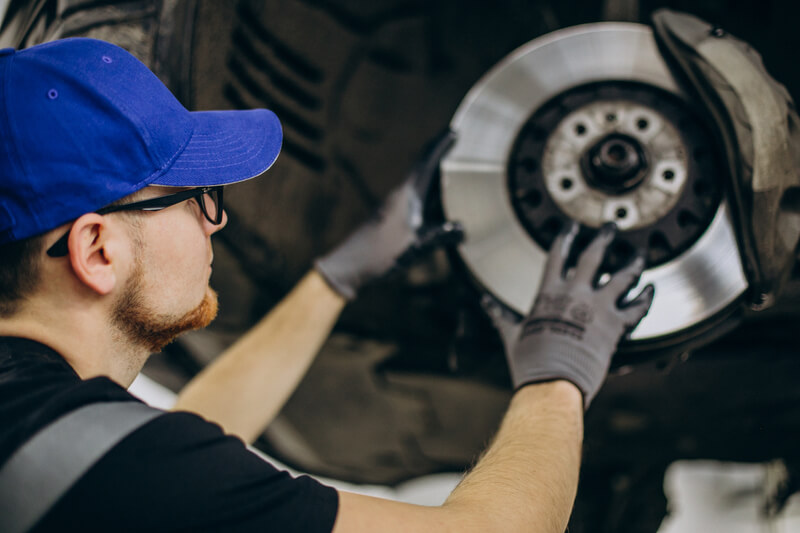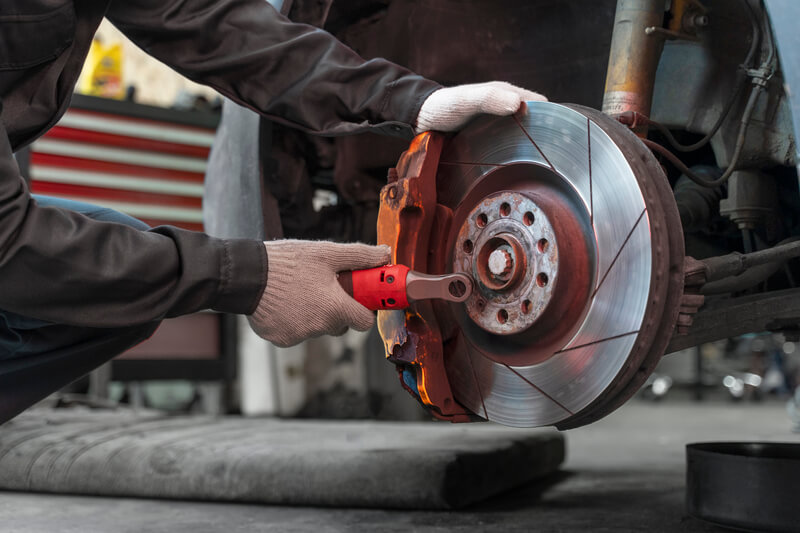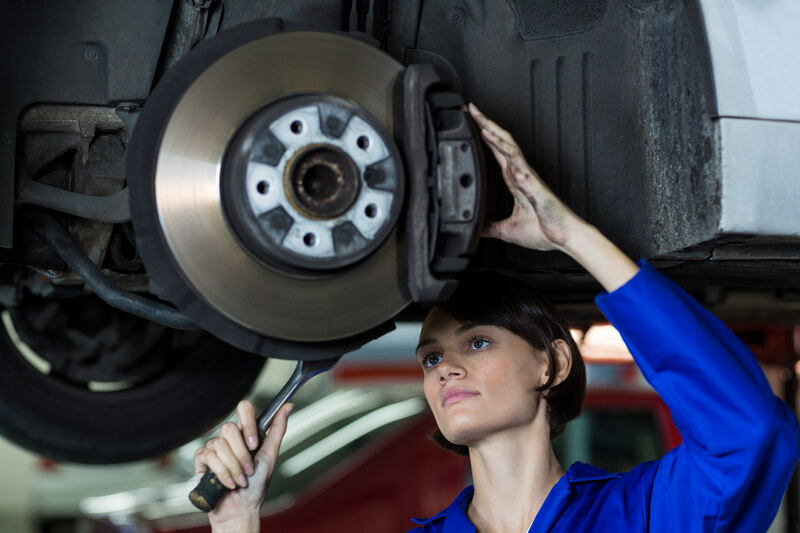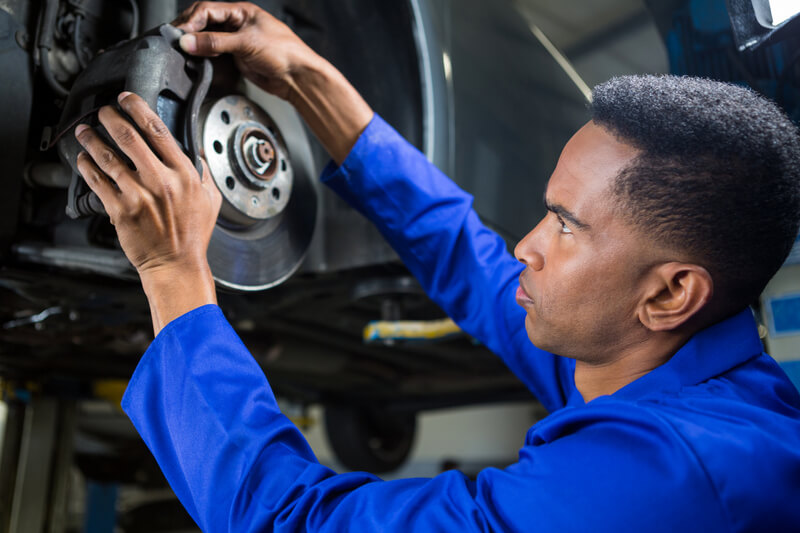Warped brake rotors refer to a condition where the metal discs that facilitate braking become distorted. Instead of a flat and even surface, they develop irregularities, causing issues with braking performance. Warping can lead to uneven contact between the brake pads and rotors. As a result, warped rotor symptoms can be reduced by stopping power and potential safety hazards. Identifying these signs early is crucial to ensure timely repairs and maintain the overall safety of the vehicle.
In today’s post, you will get to know about the major symptoms of bad rotors. But before diving into that discussion, let’s first know what causes a warped rotor.
Why Do Brake Rotors Warp?

There are various reasons that cause a brake rotor to warp. The most common cause is excessive heat buildup during braking. When the rotors become extremely hot, they cool unevenly, leading to warping over time. Aggressive driving habits, such as constant heavy braking, can exacerbate this issue. Additionally, factors like improper installation, low-quality materials, or inadequate rotor thickness can contribute to warping.
Regular maintenance and proper driving practices can help minimize the risk of brake rotor warping and extend their lifespan.
Warning Signs of Warped Brake Rotors:

Here are some commonly found warped brake rotor symptoms that you must be aware of:
- Brake pedal vibration: A pulsating sensation felt in the brake pedal during braking is a clear sign of warped rotors. The uneven surface causes the brake pads to make intermittent contact, resulting in vibration.
- Uneven braking: Inconsistent or jerky braking may lead to warped brake rotors. It also can lead to uneven pressure on the brake pads.
- Steering wheel shaking: Warped rotors can cause the steering wheel to shake or wobble when applying the brakes.
- Vehicle pulls to one side: A vehicle pulling to the left or right while braking suggests that one or more brake rotors may be warped, causing uneven braking force.
- Brake rotor surface looks inconsistent: Visual inspection may reveal irregularities on the brake rotor’s surface, such as grooves or rough patches, indicating warping.
- Failing or sticking calipers: Faulty calipers can apply uneven pressure on the rotors, leading to warping over time.
- Overheating: Excessive heat generation due to continuous heavy braking can accelerate rotor warping. This makes the brakes less effective.
Must Visit: What is ABS (Anti-Lock Braking System) in Cars and How Does it Work?
Are Warped Rotors Dangerous?

Yes, warped rotors pose a safety risk. The irregular surface causes inconsistent contact between the brake pads and rotors. This leads to reduced braking efficiency. This can result in longer stopping distances and compromised vehicle control, especially during emergency braking situations. The vibrations and shaking associated with warped rotors can also cause driver discomfort and negatively impact the overall driving experience. Addressing warped rotors promptly through professional repair or replacement is essential. This way, you can ensure the vehicle’s safety and the well-being of its occupants.
Should Warped Rotors Be Replaced?

Yes, warped rotors should be replaced to maintain braking performance and safety. Some minor warping might be correctable through machining. However, it is generally more effective to replace the affected rotors. Professional mechanics can assess the extent of warping and recommend the appropriate course of action. Replacing warped rotors with new ones ensures a smooth and even braking surface. This will provide optimal contact with the brake pads for consistent and reliable braking performance.
The bottom line,
Having a clear understanding of warped brake rotor symptoms is important. Identify the warning signs and address them promptly for safe driving. Regular maintenance and responsible driving practices can help prevent warping. If warning signs arise, seek professional inspection. Take necessary actions to maintain the effectiveness of the braking system and ensure road safety.
FAQs:
1. What causes brake rotors to become warped?
A: Brake rotors can become warped due to excessive heat buildup during braking. It can also occur because of aggressive driving habits, improper installation, or using low-quality materials. These factors cause uneven cooling and lead to distortions on the rotor surface over time.
2. Can a warped brake rotor affect the overall braking performance of a vehicle?
A: Yes, a warped brake rotor can significantly impact the overall braking performance of a vehicle. It can cause uneven braking, increased stopping distances, vibrations, and compromised vehicle control during braking. This can cause safety risks to the driver and passengers.
3. How can I prevent my brake rotors from warping?
A: Avoid aggressive driving and excessive braking. Allow the brakes to cool after heavy use, especially during long descents. Regularly inspect and maintain the braking system, including calipers and brake pads. Use high-quality rotors.
4. Are there any DIY methods to fix or reduce brake rotor warping?
A: Attempting to fix warped brake rotors as a DIY project is not recommended. Brake systems are critical for vehicle safety. Improper repairs can lead to further damage. Consult a professional mechanic to assess the condition of the rotors. Then perform necessary repairs or replacements.
